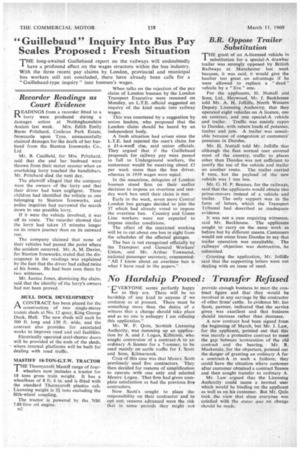B.R. Oppose Trailer Substitution
Page 56

If you've noticed an error in this article please click here to report it so we can fix it.
TE grant of an A-licensed vehicle in substitution for a special-A drawbar trailer was strongly opposed by British Railways at Manchester last week because, it was said, it would give the haulier too great an advantage if he were allowed to replace a "dead" vehicle by a " live " one.
For the applicants, H. Nuttall and Sons, Ltd., Heywood, Mr. J. Backhouse told Mr. A. H. Jolliffe, North Western Deputy Licensing Authority, that they operated eight vehicles on A licence, one on contract, and one special-A vehicle and trailer. Traffic was mainly rayon to Dundee, with return loads of potatoes, timber and jute. A trailer was unsuitable because of congestion at customers' premises in Dundee.
Mr. H. Nuttall told Mr. Jolliffe that although the fleet normal user covered most of the country, traffic to places other than Dundee was not sufficient to justify the use of the vehicle and trailer on another mule. The trailer carried 8 tons, but the payload of the new vehicle was 1 ton less.
Mr. G. H. P. Beanies, for the railways, said that the applicants would obtain two prime-movers instead of a vehicle and trailer. The only support was in the form of letters, which the Transport Tribunal had described as inadequate evidence.
It was not a case requiring witness, said Mr. Backhouse. The applicants sought to carry on the same work as before but by different means. Customers would not come from Dundee to say that trailer operation was unsuitable. The railways' objection was destructive, he submitted.
Granting the application, Mr. Jolliffe said that the supporting letters were not dealing with an issue of need.




































































































































